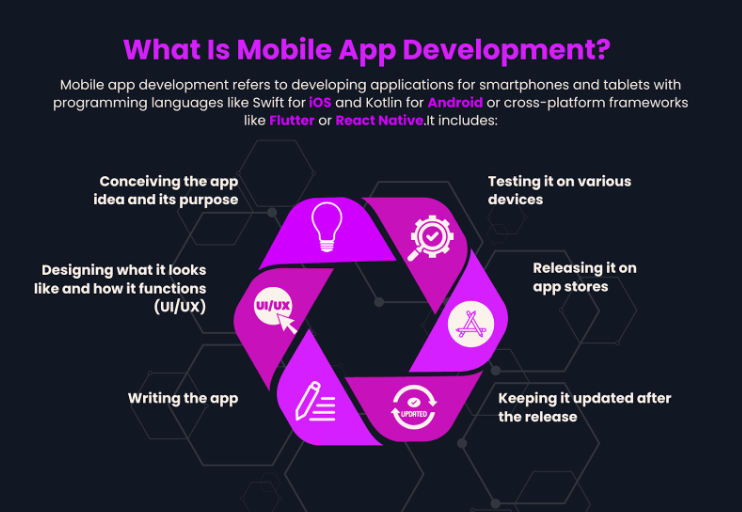Introduction
Did you know that more than half of all internet traffic today is from mobile devices? And apps? More than 90% of that time spent is on them. That's enormous. Have you ever reached for your phone, opened an app and thought, "This is just easier"?
Likewise, your customers probably do too. Whether it's browsing for products to buy, reserving a service, checking their bank balance or messaging with a business, mobile apps have revolutionised the way businesses interact.
If your business hasn't hopped on the mobile bandwagon yet, you could be missing out. Here, we're going to describe what mobile app development is, how it happens and most importantly, why your business should care.
What Is Mobile App Development?
Mobile app development refers to developing applications for smartphones and tablets with programming languages like Swift for iOS and Kotlin for Android or cross-platform frameworks like Flutter or React Native.

Low-code and no-code apps also exist, but these give easier ways for non-developers to create apps that are quicker to produce.
Knowing what is mobile app development shows you how applications progress from a thought process to something tangible your customers can utilize.
Why Should Your Business Care?
If you're still uncertain, let's dissect the value of mobile apps for business in manners that make a difference to your bottom line.
1. Mobile Apps Form Direct Customer Connections
Websites are fine. Apps? They're intimate. Once your app is on a customer's device, you have a direct and persistent relationship with them. You can deliver push notifications, provide real-time assistance and be one tap away.
This makes mobile business apps a great tool for engagement when you need to engage with your audience more deeply.
2. They Provide a Better Experience
Apps are quicker, smoother and optimized for mobile. That equals no pinching and zooming, no slow loading times and fewer drop-offs. Customers like apps because they're easy to use. That's partly why businesses are investing in business mobile app development, they want to greet users where they already are, with less friction.
3. Apps Make You Stand Out
In many industries, a clean, well-designed app can give your brand an edge. Not every competitor has one. Having your mobile app shows you’re modern, responsive and serious about delivering value.
This type of innovation can enhance your brand image and even open up new markets. The advantages of mobile application development go beyond tech, it’s about perception and leadership.
If you're looking for expert help with a sleek, high-performing app, Kombee offers mobile app development services tailored to modern business needs.
4. They Generate Real Revenue
Yes, there is an app development cost involved, but apps also bring new opportunities for earnings. You can sell merchandise directly, offer subscriptions or utilise in-app purchases. Businesses widely use apps as effective sales tools which often have better conversion rates than mobile websites.
If you've ever questioned if the value of mobile apps for business is worth the cost, the answer is usually yes particularly if you sell products or services online.
Case Study: A great example of this is Birla White, who partnered with Kombee to develop a Flutter-based mobile app. It helped streamline user engagement, secure data, and enabled easy reward redemptions—showing how the right app can deliver both value and scale.
5. Mobile Apps Provide You with Data
Ever wonder what your customers want? Your app knows. What they click on and how long they stay are a goldmine of information for apps. That information can help you hone your offerings, target marketing and tailor the experience.
That's one of the benefits of mobile application tools, they're intelligent, not merely functional.
Key Considerations & Best Practices for Successful Mobile App Development
To make the most of business mobile app development, you don't require an idea; you require a plan. Consider your app a long-term investment rather than a rapid launch.
Begin with alignment: Ensure that your app is aligned with your business objectives. Is it to sell, serve or simplify?
Prioritize user experience: If the application is not simple and enjoyable to use, people will not return.
Select the correct approach:
- Native apps provide maximum performance.
- Cross-platform tools are time- and cost-saving.
- No-code platforms are suitable for MVPs and rapid deployments.
Other best practices:
- Test on different devices and screen sizes.
- Adhere to your budget by managing app development costs early.
- Account for frequent updates and bug fixes.
- Secure user data with good security practices.
Want to make sure you choose the right development partner from day one? Read: Stop Wasting Money! Here’s How to Choose the Best Mobile App Development Company
Future-Proofing Your Business with Mobile App Innovation
Remaining competitive requires your app to be new and up-to-date. Innovation is currently one of the largest benefits of mobile app development.
Here's how to future-proof your app:
- Stay on top of trends such as AI, AR and voice commands.
- Develop based on scalable tech that expands along with your business.
- Regularly check on performance and user behaviour.
- Freshen features and UI to suit user requirements and technological changes.
- Comply with all privacy and security laws.
Treat your app like a long-term product. The true value of mobile apps for business is realised when you commit to continuous improvement.
Conclusion
Mobile app development is your opportunity to speak directly to customers, increase engagement and drive long-term growth. The benefits of mobile application tools are tangible and measurable.
Yes, app development cost is a factor. However, the benefits of mobile apps for business far outweigh the investment when built correctly.
Wondering where to start or confused about choosing the right mobile strategy? Kombee can help you turn your idea into a powerful business app built for growth.
Frequently Asked Questions
1. What can a mobile app do for a business?
A mobile app helps businesses engage customers, boost sales, improve brand visibility, and streamline operations. It offers direct communication, personalized experiences, and data-driven insights that websites alone often can’t provide
2. Can small businesses benefit from mobile app development?Absolutely. Mobile apps help small businesses build loyalty, offer better customer service, and compete with larger brands. With affordable development options, even small businesses can create powerful apps tailored to their audience.
3. What platforms should I consider for my business app?
The main platforms are iOS (Apple) and Android (Google). Choose both for broader reach, or use cross-platform frameworks like Flutter or React Native to build one app that works on both systems efficiently.






